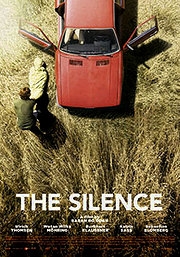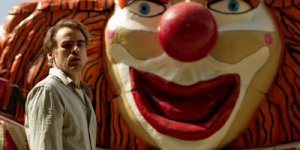The Silence

Baran bo Odar won two awards in the category of Best New Director for his student feature film Under the Sun (Unter der Sonne), which he worked on with Nik Summerer. The Silence (Das letzte Schweigen) is born out of the duo’s powerful cinematic language and refined craft of using nuanced visual images to reach inside the characters’ psyche. The film handles heavy subject-matter with sensitivity and a quality of empathetic acting that pulls the audience along with the characters at the crescendo of the picture.
Twenty-three years ago eleven-year-old Pia was raped and murdered in a cornfield, with only her bicycle left as a clue. Now, on the same spot thirteen-year-old Sinikka’s bike is found and darkened waters are stirred for those whose lives were desolated by the first crime. Krischan (Klaußner, Goodbye Lenin!), the retired police inspector, desperately seeks new evidence to solve the case that destroyed his marriage. Elena (Saß, Goodbye Lenin!), mother of the first murdered girl has old wounds opened afresh after the copy-cat crime, while Sinikka’s overwrought parents await news of her whereabouts. David Jahn (Blomberg) is the new inspector on the case, but struggles to keep his feelings towards it separate from his grief for the wife he has just lost to cancer.
Together the characters form an ensemble which focuses not solely on the demise of the murderer, nor the grieving parents, but on the overlapping pain of a wider cast of individuals. From the start of the picture we are privy to the murderer and follow his accomplice to his new life, in a startling exploration in to what it means to be a criminal, whether it is possible to change and if there is such a thing as evil, or only sickness.

Though it sometimes felt like a lengthy detective TV show, overall Odar’s primary focus veered from the predictable “Whodunit?” to instead explore the emotional state of his characters. The Silence reaches a psychological depth where the line between hate and pity for the accused is blurred, and the frustrations of parents left in the dark are balanced by the agonising journeys of the detectives who seek to enlighten them.
The Silence soon becomes not about the murder-mystery but about the characters’ unrelenting emotional investment in the case, the relationships that spring from it, and what this reveals about their own lives. Twenty-three years on, the grieving mother keeps her lost child’s room as it was, and jogs by the place of her murder daily. Even after his retirement Krischan interferes with the case that he could not solve. The two form an emotional attachment in their desperation for closure. They each seek to fill the void left by Pia’s death, but are left with a shared and resounding emptiness.

The tone of the film is taut and eerie throughout, and is intensified by slow but considered dialogue played out with perceptive sensitivity by the whole cast. Nik Summerer’s cinematic skill is complemented by the intensity of Michael Kamm and Chris Steininger’s music. The case unfurls alongside the lives of the characters, and the two are agonisingly entangled. Sweeping landscapes paired with intimate visuals that seem to live alongside the characters provide a contrast that shows the skill of Odar’s cinematic language. Gaps and distances in the vast landscapes portray the isolation and loneliness of the people within them, who feel so distant, yet are closer and more interconnected than they could imagine.
The film ends with the same sense of tension and emotional stagnation with which it begun. Though some answers may have been given, not every wound can be healed in this uncertain conclusion. The pain and anguish of the ensemble resonate throughout this moving, often terrifying picture.
If you are one for crime thrillers and mystery with emotional density, check out The Silence when it is released on 9 September 2011.

Recent Comments